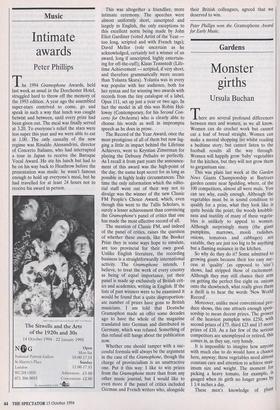Music
Intimate awards
Peter Phillips
The 1994 Gramophone Awards, held last week as usual in the Dorchester Hotel, struggled hard to throw off the memory of the 1993 edition. A year ago the assembled super-stars contrived to come, go and speak in such a way that lunch was caught betwixt and between, until every prize had been given out. The meal was finally served at 3.20. To everyone's relief the stars were less super this year and we were able to eat at 1.00. The only casualty of the new regime was Rinaldo Alessandrini, director of Concerto Italiano, who had interrupted a tour in Japan to receive the Baroque Vocal Award. He ate his lunch but had to be on his way back to Heathrow before the presentation was made: he wasn't famous enough to hold up everyone's meal, but he had travelled for at least 24 hours not to receive his award in person. This was altogether a friendlier, more intimate ceremony. The speeches were almost uniformly short, unscripted and largely in English, the only exceptions to this excellent norm being made by John Eliot Gardiner (voted Artist of the Year too long, scripted and with French tags); David Mellor (role uncertain as he acknowledged, certainly not a winner of an award, long if unscripted, highly entertain- ing for off-the-cuff); Klaus Tennstedt (Life- time Achievement — scripted, if very short, and therefore grammatically more secure than Yolanta Skura). Yolanta was in every way popular with her audience, both for her syntax and for winning two awards with records from the tiny catalogue of a label, Opus 111, set up just a year or two ago. In fact the model in all this was Robin Hol- loway (Contemporary, for his Second Con- certo for Orchestra) who is clearly able to choose his words as well in impromptu speech as he does in prose.
The Record of the Year Award, once the most prestigious of all of them but now lag- ging a little in impact behind the Lifetime Achievers, went to Krystian Zimerman for playing the Debussy Preludes so perfectly. As I recall it from past years the announce- ment of this award was the high-point of the day, the name kept secret for as long as possible in highly leaky circumstances. This time the only information which the edito- rial staff went out of their way not to divulge was the winner of the new Classic FM People's Choice Award, which, even though this went to the Tallis Scholars, is surely a lesser achievement than convincing the Gramophone's panel of critics that one has made the most effective record of all.
The mention of Classic FM, and indeed of the panel of critics, raises the question of whether these awards, like the Booker Prize they in some ways hope to emulate, are too provincial for their own good. Unlike English literature, the recording business is a straightforwardly international activity. The Gramophone intends, I believe, to treat the work of every country as being of equal importance, yet their panel is made up exclusively of British crit- ics and academics, writing in English. If the lists of past winners were to be examined it would be found that a quite disproportion- ate number of prizes have gone to British musicians. I am told that Deutsche Gramophon made an offer some decades ago to have the whole of the magazine translated into German and distributed in Germany, which was refused. Something of this refusal still hangs about the publication now.
Whether one should tamper with a suc- cessful formula will always be the argument in the case of the Gramophone, though the charge of provincialism is an unattractive one. Put it this way: I like to win prizes from the Gramophone more than from any other music journal, but I would like to even more if the panel of critics included German and French writers who, alongside their British colleagues, agreed that we deserved to win.
Peter Phillips won the Gramophone Award for Early Music.


























































 Previous page
Previous page